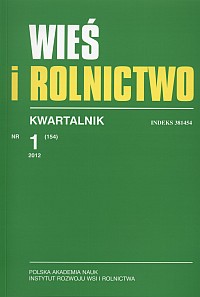ICTs as a tool for overcoming social and economic disparities and improving income situation of rural inhabitants in the EU
DOI:
https://doi.org/10.53098/wir.2012.1.154/06Keywords:
EU, ICTs, disadvantages of rural areas, income possibilitiesAbstract
Rural areas in the EU undergo social and economic transformation. Due to the diminishing role of agriculture new non-agricultural income sources are needed to maintain the vitality of rural areas; problems specific to rural areas – low population density, remoteness, lower level of public services, migration and the ageing of the population, weakness of the labour market, limited opportunities of non-agricultural employment and low quality of human capital reinforce each other creating a ”vicious circle” of deteriorating situation in rural areas; development of the knowledge-based economy creates demand for new competencies, offering at the same time new forms and possibilities of employment. ICTs have the potential to offset the structural disadvantages and diseconomies of localization in rural areas and to create new earning and co-operation opportunities. This article presents four groups of ICTs possibilities of overcoming social and economic disparities and improving the income situation of rural inhabitants in the EU.References
AEIDL, 2000: Information technologies and rural development. Observatory Dossier 4.
Anderson G. G., Melville J., Waldhorn S., 1993: Creating Economically Competitive Regions: The New Comparative Advantage. In: Industrial Policy for Agriculture in the Global Economy. Ed. S.R. Johnson, S.A. Martin. Iowa State University Press, Ames: 171–200.
Berdo J., 2006: Zrównoważony rozwój. W stronę życia w harmonii z przyrodą. Earth Conservation, Sopot.
BITKOM, 2007: Zukunft digitale Wirtschaft. Berlin.
Boix R., Vaillant Y., 2010: Industrial districts in rural areas of Italy and Spain. 50th Anniversary European Congress of the Regional Science Association International ”Sustainable Regional Growth and Development in the Creative Knowledge Economy”, 19–23 August 2010, Jonköping.
Chapman R., Slaymaker T., Young J., 2003: Livelihoods Approaches to Information and Communication in Support of Rural Poverty Elimination and Food Security. Overseas Development Institute, London.
Commission of the European Communities, 2009: Better access for rural areas to modern ICT. Commission staff working document accompanying the Communication from the Commission to the Council and the European Parliament, SEC (2009) 254, {COM (2009) 103}, Brussels.
Copus A., 2010: Dispelling stylised fallacies and turning diversity into strength: Appropriate generalisations to underpin 21st century rural cohesion policy. In: Scientific Dialogue on Cities,
Rural Areas and Rising Energy Prices. First ESPON 2013 Scientific Report, Luxembourg: 38–60.
Czyżewski A., Poczta-Wajda A., Sapa A., 2008: Globalne uwarunkowania rynków rolnych. W: Polityka rolna Unii Europejskiej po 2013 roku. UKIE, Warszawa: 7–44.
Dang Nguyen G., Jolles M., 2005: Does the European Union create the foundations of an information society for all? BEEP briefing 11.
DG AGRI, 2006: Scenar 2020. Scenario study on agriculture and the rural world. Luxembourg.
DG AGRI, 2007: Study on Availability of Access to Computer Networks in Rural Areas. Final Report.
DG AGRI, 2010: Rural Development in the European Union. Statistical and Economic Information. Report.
Krambach K., 2002: Chancen für die Vermehrung von Arbeitsplätzen in einer multisektoralen ländlichen Wirtschaft. In: Neue Arbeitsplätze im ländlichen Raum Erfahrungen aus Praxis und Politik. Ed. K. Krambach. Manuskripte 31. Berlin: 66–75.
Krejtz K., Nowak A., 2009: Znaczenie internetu dla funkcjonowania jednostki w społeczeństwie informacyjnym. W: Diagnoza internetu 2009. Red. K. Krejtz. Wydawnictwa Akademickie i Profesjonalne, Warszawa.
López M., Navarro M., Turowiec A., Hongisto P., Pérez-Trejo F., 2009: Rural Development and Open Innovation: Challenges and Perspectives. eJOV Executive – The Electronic Journal for Virtual Organizations and Networks 11: 9–20.
Nett B., Rohde M., Wulf V., 2010: Work. In: Social Impact of ICT – SMART 2007/0068. Universität Siegen, Fachbereich Wirtschaftsinformatik und Neue Medien: 122–180.
OECD, 1996: The Knowledge-based Economy. OECD, Paris.
OECD, 2001: Information and Communication Technologies and Rural Development. OECD, Paris.
OECD, 2006: The New Rural Paradigm. Policies and Governance. OECD, Paris.
OECD, 2007a: Broadband and the Economy. OECD, Paris.
OECD, 2007b: Innovative Rural Regions. The role of human capital and technology. OECD Rural Policy Conference Key Messages, Paris.
Okuniewski J., 1997: Przemiany obszarów wiejskich w Europie i w Polsce. W: Ekonomiczne i społeczne uwarunkowania i możliwości wielofunkcyjnego rozwoju wsi w Polsce. Red. M. Kłodziński, A. Rosner. Wydawnictwo SGGW, Warszawa: 19–39.
Romańska K., Stolarska M., Zaleszczuk W., 2010: Elastyczne formy zatrudnienia w praktyce. Lublin.
Rural Wins, 2003: Roadmap for ICT solutions for Rural Areas and Maritime Regions. IST-2001-33107, D. 5.3 May 2003. Mac, Limerick
Skouras D., 1998: Rural development in the European Union. In: The Common Agricultural Policy of the European Union: New market trends. Ed. G. Baourakis. CIHEAM-IAMC, Chania (Cahiers Options Méditerranéennes 29): 143–151.
TRANSFORM, 2009: Analiza porównawcza i promowanie transformacyjnego wykorzystania technologii informacyjno-komunikacyjnych (ICT) w regionach Unii Europejskiej. Tarnów.
Downloads
Article file downloads
Pages
How to Cite
Issue
Section
License
Copyright (c) 2012 Wieś i Rolnictwo

This work is licensed under a Creative Commons Attribution 4.0 International License.










